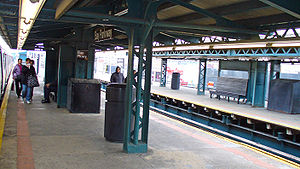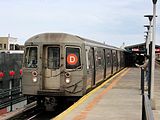Bay Parkway station (BMT West End Line)
This article needs additional citations for verification. (September 2024) |
Bay Parkway | ||||||||||||||||||||||||||||||||||||||||||||||||||||||||||||||||||||||||||||||||||||||||||||||||||||||||||||||
|---|---|---|---|---|---|---|---|---|---|---|---|---|---|---|---|---|---|---|---|---|---|---|---|---|---|---|---|---|---|---|---|---|---|---|---|---|---|---|---|---|---|---|---|---|---|---|---|---|---|---|---|---|---|---|---|---|---|---|---|---|---|---|---|---|---|---|---|---|---|---|---|---|---|---|---|---|---|---|---|---|---|---|---|---|---|---|---|---|---|---|---|---|---|---|---|---|---|---|---|---|---|---|---|---|---|---|---|---|---|---|
 Platforms prior to renovations | ||||||||||||||||||||||||||||||||||||||||||||||||||||||||||||||||||||||||||||||||||||||||||||||||||||||||||||||
| Station statistics | ||||||||||||||||||||||||||||||||||||||||||||||||||||||||||||||||||||||||||||||||||||||||||||||||||||||||||||||
| Address | Bay Parkway & 86th Street Brooklyn, New York | |||||||||||||||||||||||||||||||||||||||||||||||||||||||||||||||||||||||||||||||||||||||||||||||||||||||||||||
| Borough | Brooklyn | |||||||||||||||||||||||||||||||||||||||||||||||||||||||||||||||||||||||||||||||||||||||||||||||||||||||||||||
| Locale | Bensonhurst, Bath Beach | |||||||||||||||||||||||||||||||||||||||||||||||||||||||||||||||||||||||||||||||||||||||||||||||||||||||||||||
| Coordinates | 40°36′10″N 73°59′39″W / 40.602655°N 73.994293°W | |||||||||||||||||||||||||||||||||||||||||||||||||||||||||||||||||||||||||||||||||||||||||||||||||||||||||||||
| Division | B (BMT)[1] | |||||||||||||||||||||||||||||||||||||||||||||||||||||||||||||||||||||||||||||||||||||||||||||||||||||||||||||
| Line | BMT West End Line | |||||||||||||||||||||||||||||||||||||||||||||||||||||||||||||||||||||||||||||||||||||||||||||||||||||||||||||
| Services | D | |||||||||||||||||||||||||||||||||||||||||||||||||||||||||||||||||||||||||||||||||||||||||||||||||||||||||||||
| Transit | ||||||||||||||||||||||||||||||||||||||||||||||||||||||||||||||||||||||||||||||||||||||||||||||||||||||||||||||
| Structure | Elevated | |||||||||||||||||||||||||||||||||||||||||||||||||||||||||||||||||||||||||||||||||||||||||||||||||||||||||||||
| Platforms | 2 island platforms cross-platform interchange | |||||||||||||||||||||||||||||||||||||||||||||||||||||||||||||||||||||||||||||||||||||||||||||||||||||||||||||
| Tracks | 3 (2 in regular service) | |||||||||||||||||||||||||||||||||||||||||||||||||||||||||||||||||||||||||||||||||||||||||||||||||||||||||||||
| Other information | ||||||||||||||||||||||||||||||||||||||||||||||||||||||||||||||||||||||||||||||||||||||||||||||||||||||||||||||
| Opened | July 29, 1916 | |||||||||||||||||||||||||||||||||||||||||||||||||||||||||||||||||||||||||||||||||||||||||||||||||||||||||||||
| Accessible | ||||||||||||||||||||||||||||||||||||||||||||||||||||||||||||||||||||||||||||||||||||||||||||||||||||||||||||||
| Opposite- direction transfer | Yes | |||||||||||||||||||||||||||||||||||||||||||||||||||||||||||||||||||||||||||||||||||||||||||||||||||||||||||||
| Former/other names | Bay Parkway–22nd Avenue | |||||||||||||||||||||||||||||||||||||||||||||||||||||||||||||||||||||||||||||||||||||||||||||||||||||||||||||
| Traffic | ||||||||||||||||||||||||||||||||||||||||||||||||||||||||||||||||||||||||||||||||||||||||||||||||||||||||||||||
| 2023 | 1,714,685[2] | |||||||||||||||||||||||||||||||||||||||||||||||||||||||||||||||||||||||||||||||||||||||||||||||||||||||||||||
| Rank | 184 out of 423[2] | |||||||||||||||||||||||||||||||||||||||||||||||||||||||||||||||||||||||||||||||||||||||||||||||||||||||||||||
| ||||||||||||||||||||||||||||||||||||||||||||||||||||||||||||||||||||||||||||||||||||||||||||||||||||||||||||||
| ||||||||||||||||||||||||||||||||||||||||||||||||||||||||||||||||||||||||||||||||||||||||||||||||||||||||||||||
| ||||||||||||||||||||||||||||||||||||||||||||||||||||||||||||||||||||||||||||||||||||||||||||||||||||||||||||||
| ||||||||||||||||||||||||||||||||||||||||||||||||||||||||||||||||||||||||||||||||||||||||||||||||||||||||||||||
| ||||||||||||||||||||||||||||||||||||||||||||||||||||||||||||||||||||||||||||||||||||||||||||||||||||||||||||||
| ||||||||||||||||||||||||||||||||||||||||||||||||||||||||||||||||||||||||||||||||||||||||||||||||||||||||||||||
Bay Parkway Station (Dual System BRT) | ||||||||||||||||||||||||||||||||||||||||||||||||||||||||||||||||||||||||||||||||||||||||||||||||||||||||||||||
| MPS | New York City Subway System MPS | |||||||||||||||||||||||||||||||||||||||||||||||||||||||||||||||||||||||||||||||||||||||||||||||||||||||||||||
| NRHP reference No. | 05000670[3] | |||||||||||||||||||||||||||||||||||||||||||||||||||||||||||||||||||||||||||||||||||||||||||||||||||||||||||||
| Added to NRHP | July 6, 2005 | |||||||||||||||||||||||||||||||||||||||||||||||||||||||||||||||||||||||||||||||||||||||||||||||||||||||||||||
The Bay Parkway station (formerly Bay Parkway–22nd Avenue station) is an express station on the BMT West End Line of the New York City Subway, located in Bensonhurst, Brooklyn at the intersection of Bay Parkway and 86th Street. The station is served by the D train at all times.
History
[edit]Bay Parkway opened on July 29, 1916, as part of an extension of the BMT West End Line from 18th Avenue to 25th Avenue. The line was originally a surface excursion railway to Coney Island, called the Brooklyn, Bath and Coney Island Railroad, which was established in 1862, but did not reach Coney Island until 1864.[4] Under the Dual Contracts of 1913, an elevated line was built over New Utrecht Avenue, 86th Street and Stillwell Avenue, replacing the surface railway.[5]
The platforms were extended in the 1950s to accommodate the current standard B Division train length of 615 feet (187 m).
This station was the southern terminal for M service during rush hours until June 28, 2010.
In 2012, the station was rehabilitated and three passenger elevators (one from each platform to the mezzanine, and one from the mezzanine to street level) were added with funding from the American Recovery and Reinvestment Act of 2009.[6]
Station layout
[edit]| P Platform level | Northbound local | ← |
| Island platform | ||
| Peak-direction express | No regular service (62nd Street or Coney Island–Stillwell Avenue) | |
| Island platform | ||
| Southbound local | | |
| M | Mezzanine | Fare control, station agent, MetroCard machines |
| G | Street level | Entrances/exits |
This elevated station has two island platforms and three tracks. The center track is not normally used in revenue service. Both platforms have brown canopies with green frames and support columns in their center as well as wooden benches surrounded by green windscreens. On either sides, there are windscreen-style station signs and round lampposts. There is a signal tower at the south end of the station, at the end of the northbound platform.
This station was the terminus for the M train from 1987 to 2010 during rush hours. Although both platforms had signs indicating M trains used the center express track, they actually operated from the local tracks because there are no switches north of the station to allow trains to switch to the express track.[7] South of the platforms, two diamond crossovers were used for M trains to relay or be stored on the center track before switching to the Manhattan-bound local one for the trip northbound.
A concrete structure was built over the steel at this station. On July 6, 2005, it was listed on the National Register of Historic Places.
Exits
[edit]This station has one metal station house with concrete floors below the platforms and tracks. Two staircases from each platform go down to a waiting area/crossover, where a turnstile bank provides access to and from the station. Outside fare control, there is a token booth and four staircases going down to all corners of Bay Parkway and 86th Street. The station house formerly had windows on all four sides. However, all of them except the ones on the west side have been covered with tar.[8]
Gallery
[edit]- Elevated station house and structure
- Southeastern street stair
- Street stair before M train service to the station was discontinued
- The station as seen from the 20th Avenue station down the line
- One of three new elevators
- Manhattan-bound D train at the station
References
[edit]- ^ "Glossary". Second Avenue Subway Supplemental Draft Environmental Impact Statement (SDEIS) (PDF). Vol. 1. Metropolitan Transportation Authority. March 4, 2003. pp. 1–2. Archived from the original (PDF) on February 26, 2021. Retrieved January 1, 2021.
- ^ a b "Annual Subway Ridership (2018–2023)". Metropolitan Transportation Authority. 2023. Retrieved April 20, 2024.
- ^ "NPS Focus". National Register of Historic Places. National Park Service. Retrieved December 12, 2011.
- ^ "Opening of the Brooklyn, Bath and Coney Island Railroad" (PDF). The New York Times. June 9, 1864. p. 2. Retrieved July 28, 2020.
- ^ Senate, New York (State) Legislature (January 1, 1917). Documents of the Senate of the State of New York.
- ^ "MTA completes seven station rehabilitation projects along D Line". Railway Track & Structures. August 3, 2012. Retrieved August 6, 2012.
- ^ Marrero, Robert (January 1, 2017). "472 Stations, 850 Miles" (PDF). B24 Blog, via Dropbox. Retrieved April 27, 2018.
- ^ "MTA Neighborhood Maps: Coney Island" (PDF). mta.info. Metropolitan Transportation Authority. 2015. Retrieved August 15, 2016.
External links
[edit]- nycsubway.org – BMT West End Line: Bay Parkway
- Station Reporter — D Train
- Bay Parkway entrance from Google Maps Street View
- Platforms from Google Maps Street View


 French
French Deutsch
Deutsch










